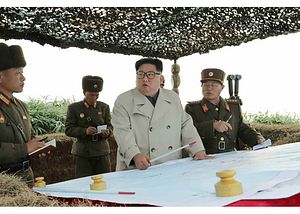Over the weekend, North Korean leader Kim Jong Un oversaw a “real war-like drill” conducted by two coastal artillery units of the Korean People’s Army. Kim observed drills and called for an increase in “combat preparations and increas[ing] fighting efficiency”
“We should give scientific, pragmatic, real war-like drill with higher degree of intensity to the servicepersons,” Kim said, according to the reporting carried by the Korean Central News Agency, North Korea’s state news agency.
Following the exercises, South Korea’s Ministry of National Defense said that it viewed the exercises as a violation of the September 19, 2018, inter-Korean Comprehensive Military Agreement (CMA) — a landmark bilateral confidence-building agreement.
“The coastal gunnery exercise that the North made mention of violates the military agreement of September 19, which the South and North Korean military authorities have hitherto faithfully implemented after agreeing on it last September,” Choi Hyun-soo, a spokesperson for the South Korean MND, remarked during a press briefing.
“We urge the North to halt all military actions that… heighten military tensions along the inter-Korean border areas and to thoroughly comply with the military agreement of September 19 to prevent a recurrence.” The South Korean side expressed regret at the development.
South Korea has not directly accused North Korea of violating the CMA since its signing last year, despite multiple launches of short-range ballistic missiles under Kim Jong Un’s guidance since May this year. North Korea has conducted 24 ballistic missile launches this year, including the first launch of the Pukguksong-3, a new type of submarine-launched ballistic missile.
In reaction to many of those missile tests, the official South Korean response was to suggest that Pyongyang’s actions “violate the spirit of the inter-Korean military agreement,” but do not constitute a direct violation. The CMA called for both sides to cease all “hostile acts” against the other on the land, at sea, and in the air, especially around the Military Demarcation Line (MDL).
Article 1-2 of the inter-Korean CMA noted that the two sides had “agreed to cease all live-fire and maritime maneuver exercises within the zone north of Deokjeok-do and south of Cho-do in the West Sea, and within the zone north of Sokcho and south of Tongcheon in the East Sea.” The KPA’s weekend live fire drills took place within that range.
Article 1-2 of the agreement also noted that the two Koreas had agreed to “install covers on the barrels of coastal artilleries and ship guns and close all gunports within the zones.”
Last week, during hearings before the U.S. Senate Foreign Relations Committee, Stephen E. Biegun, the top U.S. envoy for North Korea, remarked that North Korea may return to “provocative steps” should a deal between Washington and Pyongyang fail to materialize by year’s end.
“I can imagine that we could see a possibility of going back to some of the more provocative steps that preceded the start of this diplomacy to begin with,” Biegun said. “I think that would be a huge mistake and a missed opportunity by the Democratic People’s Republic of Korea,” he said.

































